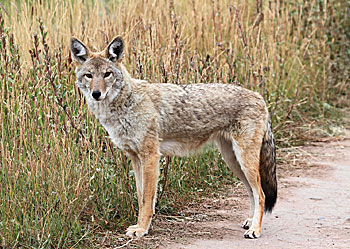By Katie Volat, DVM
Conflict with Coyotes and Raccoons

In the past year, I have lost several feline patients to tragic encounters with coyotes. If your cat is allowed outside, it is important to ensure you have a method of bringing them in at dusk to keep them safe at night. Training a cat to respond to it’s name being called or shaking a treat canister is a great way to get your cat back inside at night when most attacks occur.
Dogs should also be kept indoors at night to minimize the potential for skirmishes. Before letting your dog out at night for a potty break, make sure to turn on outside lights and take a look around while making a bit of noise. This may be enough to scare off a hungry raccoon or coyote. Just because your dog is small, don’t assume he will not want to defend his territory. You also may want to keep your dog on leash at night when allowed out for eliminations – even in the backyard.
Wildlife Diseases
Dogs tend to take it a step further by considering fecal droppings of wildlife as a delicious snack. Fleas and ticks can hop on your pet while it walks through grass, sand or soil. Talk to your veterinarian about parasite prevention to keep your pet parasite-free. New products are safer and more effective as well as easier to administer than previously available options.
Rabies Protection
Vaccinations are a simple, safe and effective way to protect your pet from wildlife diseases such as rabies. In the last 8 years, there has been an average of 1 reported case of rabies in dogs and cats per year in the state of California. There was also 1 human death in California as a result of a rabid bat bite within the last 2 years. Your pet could get rabies from a bite from an infected host. The most common hosts in our area are bats, skunks and occasionally raccoons.
There is no treatment or cure for rabies, only vaccination can protect your pet. Since rabies is fatal, it makes sense to vaccinate your pet rather than run the risk of infection. Worldwide, over 55,000 people die each year due to rabies infection. Even indoor cats are not safe, as a rabid bat has flown into a home with indoor cats that were not vaccinated for rabies. As a result, these cats were quarantined for 6 months and the family in the home needed post-exposure vaccinations. Cats are not required to have rabies vaccinations in California; however, it may be a good idea.
•••
Contact Santa Cruz County Animal Control: 831-454-7227 or After-Hours Emergency: 831-471-1182 for assistance with handling wildlife on your property. Contact your veterinarian for guidance in choosing the right approach to keeping your pets safe!